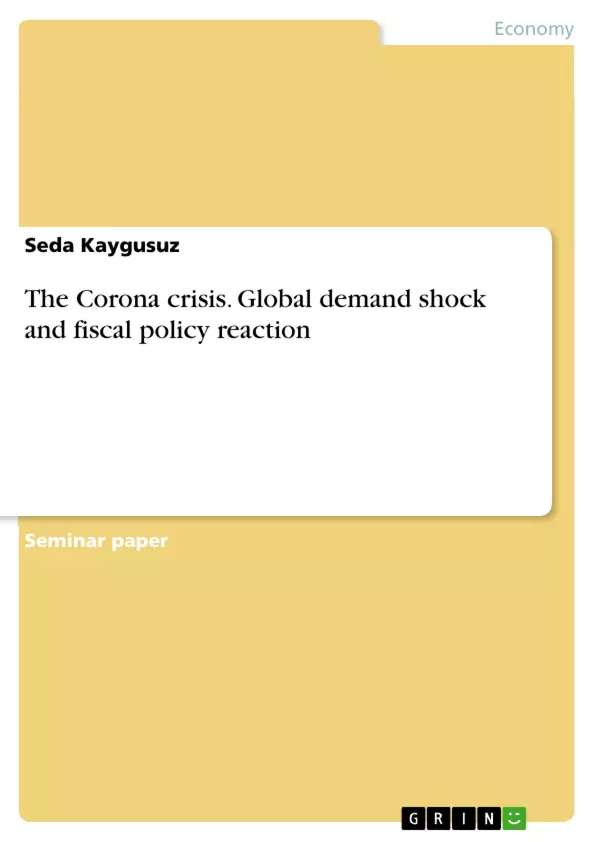The global economy has shifted from a mostly growing economy into a severe, almost life-threatening recession or even depression within of weeks and months. The aim of this term paper is to show the real impacts of the Corona crisis on the economy. Especially the impacts on demand and fiscal policy reactions are described in this term paper.
The wealth of a country depends, among other things, on the overall economic situation, which is usually defined as the business cycle. Good indicators of an economic situation are generally indicators such as the employment rate, the unemployment rate, prices and development of interest rates, sales and capacity of utilization. The pandemic has completely changed all areas of life overnight including the world economy. In addition, to protect of people and address issues of mobile working, new products had to be developed very quickly, for politicians to make current assessments and decisions. The exceptional circumstances have posed challenges to all and raised very similar questions for humanity: what will be the consequences of the pandemic for the economy, for international cooperation in education, academic research, and culture?
Inhaltsverzeichnis (Table of Contents)
- Introduction
- Issue and objectives of the thesis
- Structure
- Background information
- Definition of COVID-19 pandemic
- Business cycle and IS-LM Model
- Economics before the COVID-19 pandemic
- Effects of the Corona crisis
- Corona crisis versus global financial crisis
- From global health crisis to recession - impacts on economy
- World trade impacts
- Government support in response to the COVID-19 pandemic
- Final assessment
- Summary
Zielsetzung und Themenschwerpunkte (Objectives and Key Themes)
This seminar thesis aims to analyze the real impacts of the Corona crisis on the global economy, specifically focusing on the effects on demand and the fiscal policy reactions implemented in response. The thesis explores the shift from a mostly growing economy to a severe recession within weeks and months.
- The impact of the COVID-19 pandemic on the global economy, including the shift to a recession.
- The role of fiscal policy in responding to the economic consequences of the pandemic.
- Comparison of the Corona crisis with the global financial crisis.
- Analysis of the impacts on world trade and the global supply chain.
- Examination of government support measures implemented to mitigate the economic effects of the pandemic.
Zusammenfassung der Kapitel (Chapter Summaries)
The first chapter introduces the thesis, outlining its objectives and structure. Chapter 2 provides relevant background information, including the definition of the COVID-19 pandemic and a discussion of business cycles and the IS-LM model. Chapter 3 analyzes the effects of the Corona crisis on the economy, comparing its impacts to the global financial crisis, discussing the transition from a health crisis to a recession, examining the impacts on world trade, and exploring the government support measures implemented in response to the pandemic. Chapter 4 offers a summary of the key findings and provides an outlook on possible future economic trends.
Schlüsselwörter (Keywords)
This thesis focuses on the economic impacts of the COVID-19 pandemic, examining the global demand shock, fiscal policy responses, and the comparison with the global financial crisis. Key terms include: COVID-19, pandemic, recession, depression, fiscal policy, government support, demand shock, world trade, supply chain, business cycle, IS-LM model, and economic indicators such as GDP and unemployment rates.
- Arbeit zitieren
- Seda Kaygusuz (Autor:in), 2021, The Corona crisis. Global demand shock and fiscal policy reaction, München, GRIN Verlag, https://www.grin.com/document/1420335



